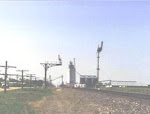Cash for clunkers?
Sounds perfectly reasonable; stimulus money put to work to benefit the ailing auto industry; to benefit the environment through the retirement of older gas-guzzling cars; and to help people afford a new car. What could be a better use of our money?
Hmmm. It's hard to argue with the benefit to the automakers and dealers. Ford, GM and Chrysler have all begun to scramble to keep up with orders for qualifying cars. And if you got $4500 Obamadollars to put toward the purchase of a new ride you are a happier camper than many of the rest of us.
But as with all things the government does, it might pay to ask a few questions:
What happens to the car (read: clunker) you trade in? The short answer is that it goes to the scrapyard. If you are turning in a rusty 1976 Olds 98 there is little to say. But if you are trading a perfectly serviceable 10-year-old GMC pickup or Chevy Suburban, especially one with lower miles, they are sending a good used car to the crusher. It is, as they say, the law.
"Big deal," you say. "Get them off the road. They burn too much gas."
True enough, but what does that do to, say, the used car market? Decent cars that might have been available to people with reduced purchasing power might soon be hard to find. That forces these people to keep their older-yet land barges on the road, smoking up the interstate with a thick cloud of heavy blue oil-rich exhaust. Cars they might have been able to afford and use for years to come are soon to be four-by-four iron cubes. Used cars for all of us, with the market being artificially tampered, will become a little more scarce and expensive to those who least can afford it.
Really? They crush these cars? Yup. they do, no matter how drivable they are. Had you asked where they go that might be an even better question, because before they are crushed, an inspector of the United States of America is obliged to check the "VIN" numbers of the clunkers, and compare them to the lists of numbers of trade-in's. The purpose of this is to prevent the gas-guzzling clunkers from finding their ways back onto American highways at great cost to our economy.
With the hiring of hundreds of inspectors to keep up with the piles of accumulating clunkers, no one has mentioned that cost to the economy. Or the cost of crushing and storing these vehicles until they can go to the steel company. It is rumored that one scrapper has several hundred acres of cars in a suburban Kansas City area county waiting for US Government clearance to be crushed. Now there is a cost to him which he will have to pass on to the rest of us, not to mention the cost of old leaky vehicles sitting on pastureland, just inviting an EPA impact statement to be completed.
What happens to the crushed cars? That's another nail in the coffin. An influx of scrap iron all over the country will drive prices down. With an economy already ailing this sector will ail even more than it was.
So we have a government program giving away money that was borrowed from the Chinese, to people who buy new cars if they are willing to trade for a higher-mileage model. It corrupts the used car market, denying poor people an opportunity to get a better car; wastes more Chinese loan money to hire so=called inspectors to verify that these trade-ins are scrapped; pollutes the countryside, and depresses the steel industry.
Any other questions? What's that? What's the matter with cars selling well, you say? Nothing I suppose.
Except half of them are Japanese. Ford, GM and Chrysler are just under fifty percent of the new car sales in the clunker program. The rest are from overseas. Even if manufactured here, the money goes back to Japan, Korea or Germany. The most optimistic among us will cheer at the fuel that will be saved with the old clunkers off the road.
But a few of us don't know why the Chinese keep loaning us money.
Like Kramer once said to Jerry, "...but they know. And they're the ones writing it off!"
Subscribe to:
Post Comments (Atom)








all good points, and i very much enjoyed the ending!
ReplyDelete